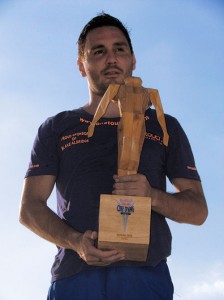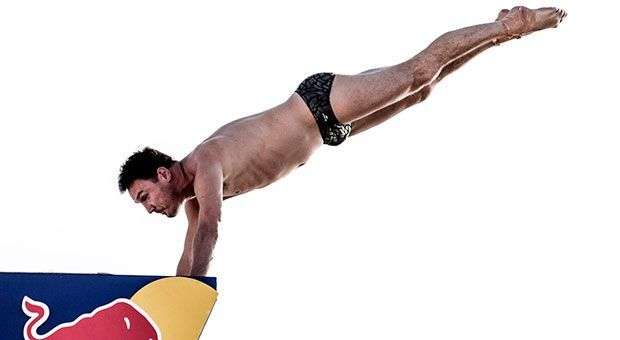Blake Aldridge is in the clouds. It’s been just over an hour since he was, standing on his head, watching the dozens of vessels surrounding the Havana’s Morro Castle. At that time, terrifying for most of humanity, the British left his mind in blank and gained momentum just before dropping for three seconds into the water.
It may sound simple, but when in the fall you have to make two and a half turns, four turns and worry about entering the cleanest and vertical way as possible in a water wall, the challenge is complicated in the extreme, because the sea, very refreshing and gentle enough, becomes a concrete wall when these divers come down from the heights.
That impact, Aldridge, 31, didn’t feel it to the full extent during his last dive in Havana, which gave him the title at the first stop of the Red Bull World Series of Cliff Diving, to the point that after the competition, he could not almost walk and had his ankle bandaged with somewhat worn brown strips.
“too long standing, too many interviews , very long ,” he says smiling although somewhat tired after multiple talks with most of the press corps , which had hardly taken him into account during the previous days , since nobody foresaw he had any chance of success to reach the podium.
But that is not a problem for this British; after all, he has dealt with far worse scenarios in his life, from indictments and arrests for theft and personal assault, to a retinal detachment in the dawn of his career, problem solved with laser eye surgery.
“That was the beginning of my life as an athlete,” he says, while his rubs left hand, which displays a tattoo of the Olympic rings. Not surprisingly, the British jumped from ten-meter platform synchronized event at the 2008 Beijing summer event with Tom Daley, when they finished eighth.
A few months later, Aldridge found reasons to climb a few meters and experience in the Cliff Diving, a modality that has allowed him to find himself, as he says again and again: “It’s completely awesome. When you leave the platform there is no turning back. It is an amazing feeling, a challenge to death. ”
With this constant, Aldridge has squandered three seasons in the Red Bull World Series, in which he had failed to have sounding results, although certain specialists agreed on his ability to scale positions, his experience in sports and evolution of traditional repertoire.
Just this last detail catapulted him to the top of the recent Havana event, to which he came with a not very heavy training load , based primarily on balance, the exercise of the legs and torso , executing somersaults in ground to simulate a launch and rapid , vital contraction at the entrance to the water , the more cumbersome the time of tumbling, since some parts of the body are exposed to absolute deceleration and others above the surface , remain at maximum speed.
This he completed with the demonstrations in a diving show in England. “That was all I did before coming to Havana, but as such, I didn’t do any extreme dive since the final in Thailand last year, about six months ago,” he says.

Guru of early stops?
“It’s crazy, it seems I can do better earlier in the season. Last year in La Rochelle , France, I was third, but then I did not jump well in the rest of the season and unfortunately I could not go higher on the podium . I hope this is a new beginning.
Feelings after the triumph?
“I have waited for years for this. After looking and search satisfaction is tremendous, I still cannot believe it has really been a surprise, I did not think it would happen now . The first day was very bad after so long without jumping and options were slim , I was forced to do something awesome, unusual , so I changed the end of the program to jump to handstand , two and a half turns with four twists , one of the most complicated now with difficulty of 6.3 . ”
How risky can be a variation of this type?
– “Very dangerous, you have the jump in your head, memorized, and you need to record when you change anything in your mind, because the slightest doubt can be a fatal accident. This time, the change to four turns, to increase the degree of difficulty was not so complicated, because I had done it in the past and is my favorite. In all honesty, I did not know if I could win, but came out exceptionally well. ”
Differences between the Olympics and Cliff Diving?
“We are talking about almost three times the height of the traditional platform, ten meters, that’s a difference to keep in mind that causes you to be more fearful, more anxious. We must also be more time in the air.
“But I think the most important difference is in the training. In the conventional diving every day can jump, jump, jump and jump and run polishing drills, technique. In Cliff Diving, like the entrance to the water is so hard, it becomes impossible to practice continuously and for long periods of time.
“Thus, it costs a lot to get to feel totally comfortable with your routines. In addition, the platform is different; you have to face random weather conditions, as wind, no wind, the rain, the sun, is very hard. ”
After this victory, you have more confidence going into the next competition?
“It was my first win in the World Series, is exhilarating, but you have to take it easy. Think now if I win or lose is a bit rushed, it is important to focus on perfecting jumps, maybe I can achieve to stay on the podium. ”
What did you take from Havana?
“Let me think, besides the trophy … hospitality, sun, climate and the scenario, everything was a complete phenomenon. Cuba is a great country and people have also been wonderful.











